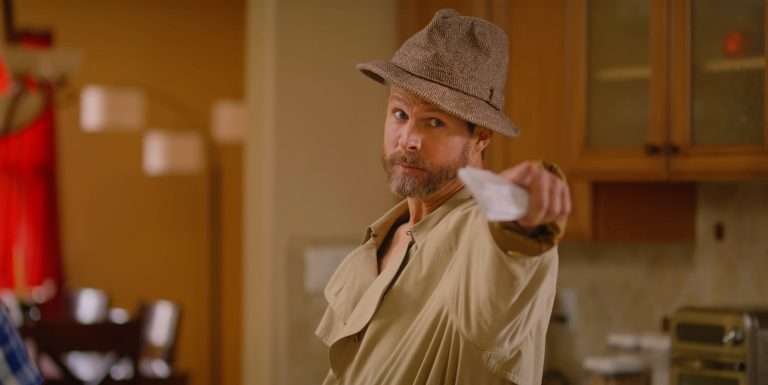At the beginning of the third act of “Beautiful Rebel” (Original Title: Sei nell’anima), the mostly wart-free, inoffensive biopic about Italian rock star Gianna Nannini, we see Gianna (played by Elitza Toni) suffering from a mix of withdrawal symptoms as well as a concussion obtained from an automobile accident. It compounds into a psychosis generated by insecurity regarding her voice, her boyfriend Marc’s apparent dismissal of her worth in their relationship, and the pressure from her manager Roger Kranz to deliver a hit, as well as a deep-seated dilemma of identity that leads to friction between Gianna and her conservative father, which expresses itself in Gianna hallucinating and wanting to be reborn through her mother’s womb.
It’s this entire fifteen-to-twenty-minute stretch of the movie that makes you realize why “Beautiful Rebel,” adapted from the autobiographical novel Cazzi Mei, would have been greenlit. It also answers the question of why director Cinzia TH Torrini would be granted the duties to helm the movie about presumably one of the more iconic rock stars of the Italian music scene. It’s here that montage sequences are applied, and quick edits underscored to Nannini’s Contaminata are established. We see a semblance of visual verve and style. The disadvantage is it takes almost an hour to reach these compelling moments, trudging through a very templatized bland narrative associated with most music biopics.
Music biopics serve as a gateway to an artist’s struggles as well as a sampler of their artistic expressions. It is different when the biopic feels heavily curated, and while officially it is not addressed, the movie’s release in conjunction with the release of the artist’s new work is quite suspect. Thus when the artist’s voice becomes part of the creative process. Contamination feels almost inevitable. From that perspective, “Beautiful Rebel” choosing to dive deep into Nannini’s rehabilitation feels like a positively brave attempt. None of these ancillary elements would be remotely necessary to address if the movie had a semblance of energy or a distinctive visual identity.

Instead, the movie is content with hitting the important beats of Nannini’s life: her fight for acceptance as an artist, her battle with producers in identifying her sound, her attraction, and her flaky outlook regarding relationships. All these moments are treated superficially, with the scenes just a second quicker than necessary, almost as if to not waste time lingering on their superficiality in fear of the viewers realizing the blandness of the screenplay.
There are moments where the film dabbles into Nannini exploring her sexuality and even hints at Nannini’s promiscuity, but it never gives those moments enough time to marinate. A similar issue lies in the movie’s exploration of the process of making music and Nannini’s exploration of her sound, finally deciding upon the correct genre suited to her artistic expression, as well as how to pivot when forced to relocate to a new country to record. These are all fascinating asides that might make for a great book or even a longer version of this film, but the movie always stays in a state of perpetual motion.
As a newcomer to Nannini’s sound, “Beautiful Rebel” does work as a nice introduction to her discography, though you are left to wonder if the punk-rock nature that identifies her rebellion through tracks like “Death by Self-Inflicted Abortion” needed associative punk-rock energy or just a modicum of the anger and frustration experienced by the artist, perhaps channeled through any distinctive visual information or auditory experimentation.
But again, that becomes speculation on the part of a reviewer, acting upon expectation for a film and just trying something beyond being slavishly devoted to a template. As described at the beginning of the review, that entire twenty-minute stretch is the only time the movie resembles something remotely compelling. It’s a shame, considering the very sincere performances of the cast, especially from Toni as Nannini and Maurizio Lombardi as her father, Dannilo. The end of the film, incorporating footage from actual concerts by Nannini, only highlights the missed opportunity the movie had in evoking or describing her musical prowess through a process-oriented lens rather than a bland, albeit sincere one.







![The Severing [2022]: ‘Slamdance’ Review – Calisthenics that careen into tedium](https://79468c92.delivery.rocketcdn.me/wp-content/uploads/2022/01/The-Severing-Slamdance-768x576.jpg)

